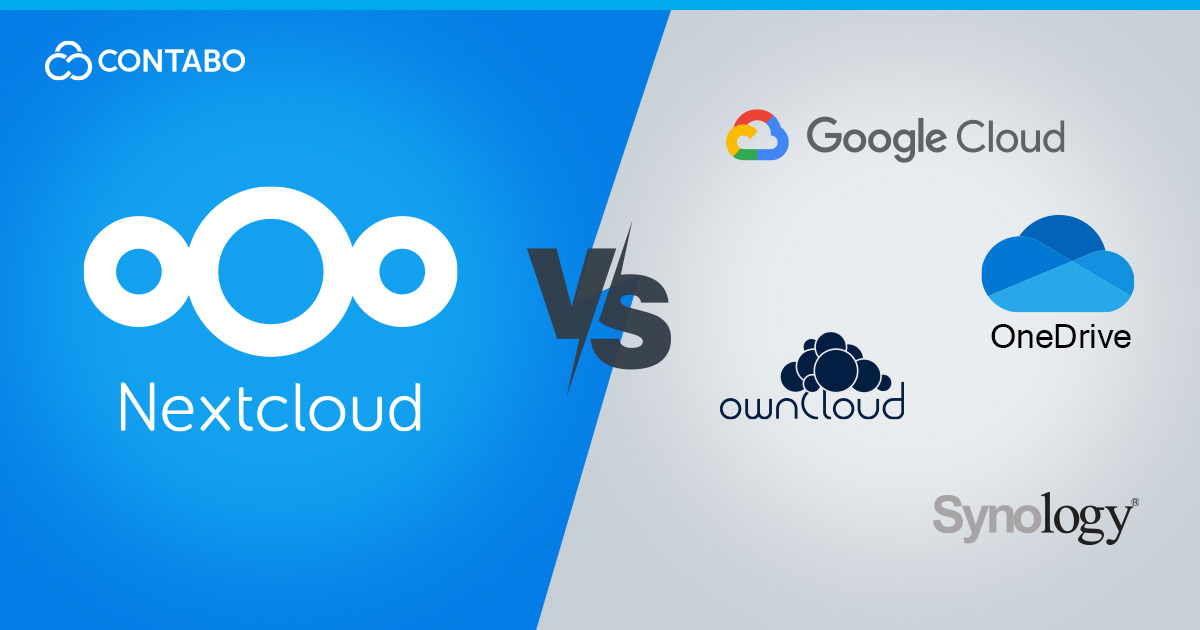
Handing your files over to services like Google Drive or Dropbox is standard practice, but it comes with a catch: your data isn’t truly yours. Growing concerns about privacy and data ownership are leading many to look for alternatives. A Nextcloud self-hosted installation is a popular choice for taking back control. But is it the right choice for you? This guide breaks down the most common comparisons. We’ll put Nextcloud vs Google Drive head-to-head to see how self-hosting stacks up against big tech. We will also clarify the important Nextcloud vs ownCloud difference, which has its roots in a shared history. For those considering an all-in-one hardware box, we’ll look at the pros and cons of Nextcloud vs Synology.
The Fundamental Shift to Data Ownership
The convenience of mainstream cloud services comes at a hidden cost: you give up ownership of your data. When you upload a file to a third-party provider, it sits on their servers, governed by their terms of service. They can scan your files, analyze your data, and change their policies at any time. This has led to a fundamental shift for many users and businesses towards reclaiming control. So, why choose Nextcloud? The answer lies in this principle of data ownership.
Opting for a Nextcloud self-hosted platform means you are in complete command. Your files reside on hardware you control whether it’s a server in your office or a VPS with a hosting provider of your choice. You determine the rules for data access, sharing, and encryption. There is no third party reading your terms of service to scan files for marketing data or locking you out of your account without explanation. A Nextcloud self-hosted setup is not limited to storing files online; it’s about building your own private cloud where privacy and control are the default, not an afterthought.
Nextcloud vs. Google Drive/OneDrive: The Case for Ownership and Customization
Google Drive and OneDrive are the default choices for cloud storage for a reason. They are incredibly convenient, deeply integrated into their ecosystems, and offer a generous amount of free storage to get you started. However, this convenience comes with significant trade-offs in control and privacy. The debate of Nextcloud vs Google Drive or Nextcloud vs OneDrive isn’t just about features; it’s about fundamentally different approaches to handling your data.
The most significant difference is control. With Google Drive and OneDrive, your files live on corporate servers, subject to terms of service that allow for data scanning and analysis. Nextcloud places your data on your own server, giving you the final say on who can access it and why. This also impacts the cost structure. While the subscription fees for Google and Microsoft seem straightforward, they scale up as your storage needs grow. With Nextcloud, you choose your hardware or hosting plan, which often results in a lower cost per terabyte and predictable expenses without the risk of a service changing its pricing tiers.
Beyond storage, Nextcloud shines in its customizability. Google Drive and OneDrive are closed platforms; you can only use the features they provide. Nextcloud is an open-source platform with a rich ecosystem of apps. You can extend its functionality to include collaborative office document editing, video conferencing with Nextcloud Talk, calendar and contact synchronization, and much more. This allows you to build a complete, private productivity suite tailored to your exact needs, a level of personalization that proprietary services simply cannot offer.
Nextcloud vs. ownCloud: The Fork and Its Legacy
To understand the Nextcloud vs ownCloud comparison, you have to look at their shared history. Nextcloud was created in 2016 when Frank Karlitschek, the founder of ownCloud, left the project along with many of its core developers. This event, known as a “fork,” created two separate but related platforms from the original ownCloud open source code. The split was driven by differing views on the project’s community engagement and business model.
Today, the primary ownCloud Nextcloud difference lies in their development philosophy and feature set. ownCloud operates on an “open-core” model, offering a basic, free Community Edition alongside a paid Enterprise Edition that includes exclusive features. Nextcloud, in contrast, provides one complete, open-source version of its software to everyone. While they offer paid enterprise support, it does not unlock any additional software functionality; all features are available to all users from the start.
This difference in approach has led to different development paths. Nextcloud has seen more rapid feature expansion, with a strong focus on building an all-in-one collaboration platform that includes integrated video calls (Nextcloud Talk), calendar, contacts, and a significantly larger and more active app store. While both platforms offer secure file synchronization, the decision between Nextcloud vs ownCloud today often comes down to this: users looking for the most feature-rich and completely open-source package typically lean towards Nextcloud, while those committed to ownCloud’s specific enterprise offerings may stick with their ecosystem.
Nextcloud vs. Synology: The DIY vs. Plug-and-Play Trade-off
Synology: The Plug-and-Play Appliance
The Nextcloud vs Synology comparison is less about software features and more about the fundamental approach to creating your personal cloud. Synology is a leading manufacturer of Network Attached Storage (NAS) devices, which are essentially small, dedicated computers designed for easy file storage and sharing. They offer a polished, all-in-one hardware and software package. Nextcloud, on the other hand, is a flexible software platform that you can install on hardware of your own choosing. The decision comes down to a trade-off between plug-and-play simplicity and do-it-yourself flexibility.
Nextcloud: The Path of Flexibility and Control
A Synology NAS is an appliance. You buy the box, insert hard drives, and follow a simple setup wizard. Its operating system, DiskStation Manager (DSM), is user-friendly and comes with its own suite of apps for file syncing, photos, and calendars that are similar in concept to Nextcloud. The primary benefits are ease of use, low power consumption, and a reliable, integrated experience. The downside is that you are locked into Synology’s hardware and proprietary software ecosystem. Customization is limited, and the performance you get is limited to the model you purchase.
Running a Nextcloud home server offers the opposite experience. You have complete freedom to choose your hardware—from a tiny Raspberry Pi to a powerful Dedicated Server or a Cloud VPS. This allows you to tailor performance and storage precisely to your needs and budget. The open-source nature of Nextcloud gives you access to a much larger app library and deeper customization options. The trade-off is the initial setup and maintenance, which requires a greater degree of technical knowledge. For users wondering about a middle ground, it is possible to run a Synology NAS Nextcloud setup, often using Docker. This combines the Synology hardware with the powerful Nextcloud software, but it adds a layer of technical complexity to the set-up and management process.
Alternative Hardware and Pre-configured Solutions
The idea of setting up your own server can sound daunting, but the path to self-hosting Nextcloud doesn’t have to be complex. A number of solutions exist to simplify the process, making it accessible even for those with limited technical experience. The right Nextcloud hardware depends on your needs, but getting started is easier than you might think.
One of the most popular entry points is NextcloudPi. This is a pre-configured version of Nextcloud, packaged as a ready-to-use image, initially designed for the Raspberry Pi but now supporting a wider range of single-board computers and devices. NextcloudPi automates the most challenging parts of the setup, including the web server, database configuration, and even security certificate installation. It provides a simple web interface for managing your instance, drastically lowering the barrier to entry for a reliable home server.
Beyond pre-configured images, the flexibility of Nextcloud hardware is one of its greatest strengths. You can repurpose an old desktop or laptop, giving it new life as a powerful private cloud. For those who prefer something smaller and more energy-efficient, a wide range of single-board computers (SBCs) or dedicated mini-PCs offer a great balance of performance and low running costs. Alternatively, your Nextcloud hardware doesn’t have to be physical hardware in your home at all. Renting a small Virtual Private Server (VPS) from a hosting provider is an excellent and common way to run Nextcloud, giving you a fast, reliable connection without having to manage the physical machine yourself.
Conclusion – Who is Nextcloud for?
The journey to data ownership is a choice between convenience and control. While proprietary services offer a simple entry point, platforms like Nextcloud provide a powerful, open-source alternative for those who want to manage their own digital environment. The core Nextcloud benefits are clear: complete control over your data, unmatched privacy, and the freedom to customize a platform that extends far beyond simple file storage.
So, who is Nextcloud for? Nextcloud is for the individual tired of having their data mined for marketing. It’s for the family that wants to share photos and documents in a private, secure space. It’s for the business that needs a flexible, scalable, and compliant collaboration suite without vendor lock-in. Whether you are a tech enthusiast building a home server or a privacy-conscious user, Nextcloud offers a path to reclaim your data. For those who find the benefits compelling but don’t want to manage the hardware and maintenance themselves, using a Nextcloud hosting provider can offer the perfect balance of power and convenience. Ultimately, choosing Nextcloud is about deciding that your data is yours, and yours alone.
Nextcloud Hosting FAQ
Why should I choose Nextcloud over a service like Google Drive?
The primary reason is data ownership and privacy. With Nextcloud, your files are stored on a server you control, not on corporate infrastructure. This means no third party can scan your data for advertising or change the terms of service. You also get far more customization with a rich ecosystem of open-source apps.
What is the main difference between Nextcloud and ownCloud?
Nextcloud originated from ownCloud but now operates differently. The key difference is the licensing model. Nextcloud offers one complete, fully open-source version to all users. ownCloud uses an “open-core” model, with a free community edition and a separate, paid enterprise edition that contains exclusive features.
Do I need to be a technical expert to run Nextcloud?
Not necessarily. While a manual installation offers the most control, there are much simpler options. Projects like NextcloudPi automate the entire setup process for single-board computers. Alternatively, you can use a managed Nextcloud hosting provider, which handles all the setup and maintenance for you.
For those who want to give the self-hosted experience a try, we got you covered with our detailed guide on “How to Install Nextcloud on VPS”.
What kind of hardware do I need for a Nextcloud server?
You have many flexible options. Nextcloud can run on a low-power device like a Raspberry Pi for a few users, a repurposed old desktop or laptop for more performance, a dedicated mini-PC, or a Virtual Private Server (VPS) rented from a hosting company.
